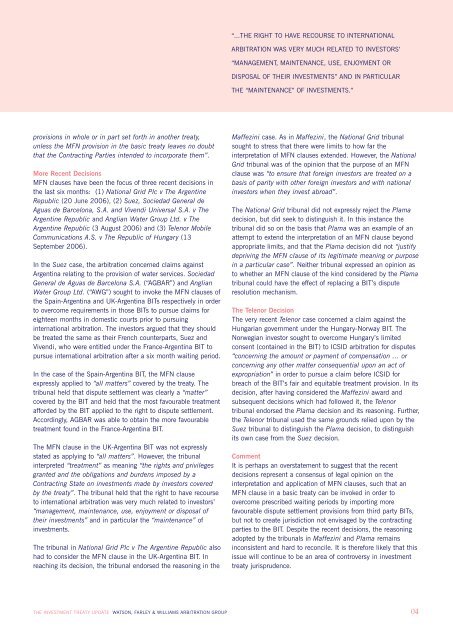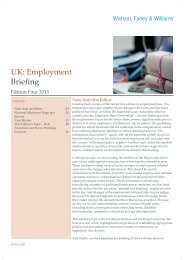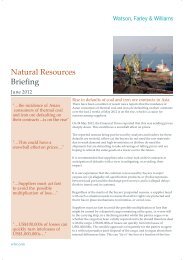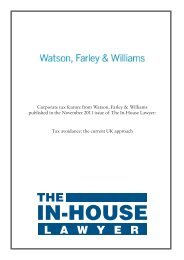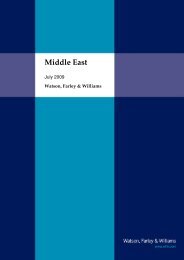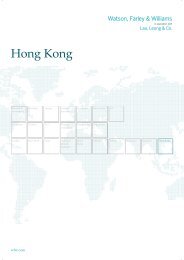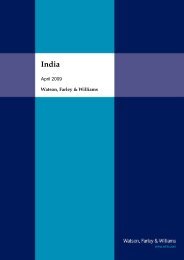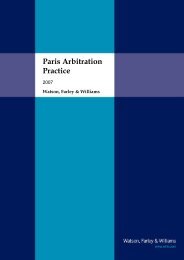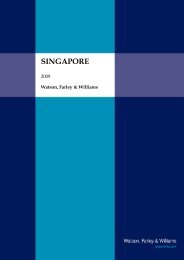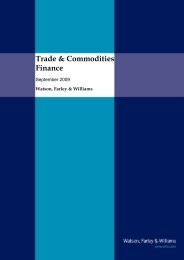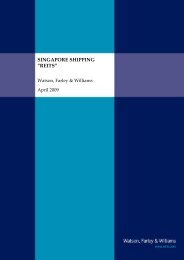Investment Treaty Update - Watson, Farley & Williams
Investment Treaty Update - Watson, Farley & Williams
Investment Treaty Update - Watson, Farley & Williams
You also want an ePaper? Increase the reach of your titles
YUMPU automatically turns print PDFs into web optimized ePapers that Google loves.
“...THE RIGHT TO HAVE RECOURSE TO INTERNATIONALARBITRATION WAS VERY MUCH RELATED TO INVESTORS’“MANAGEMENT, MAINTENANCE, USE, ENJOYMENT ORDISPOSAL OF THEIR INVESTMENTS” AND IN PARTICULARTHE “MAINTENANCE” OF INVESTMENTS.”provisions in whole or in part set forth in another treaty,unless the MFN provision in the basic treaty leaves no doubtthat the Contracting Parties intended to incorporate them”.More Recent DecisionsMFN clauses have been the focus of three recent decisions inthe last six months: (1) National Grid Plc v The ArgentineRepublic (20 June 2006), (2) Suez, Sociedad General deAguas de Barcelona, S.A. and Vivendi Universal S.A. v TheArgentine Republic and Anglian Water Group Ltd. v TheArgentine Republic (3 August 2006) and (3) Telenor MobileCommunications A.S. v The Republic of Hungary (13September 2006).In the Suez case, the arbitration concerned claims againstArgentina relating to the provision of water services. SociedadGeneral de Aguas de Barcelona S.A. (“AGBAR”) and AnglianWater Group Ltd. (“AWG”) sought to invoke the MFN clauses ofthe Spain-Argentina and UK-Argentina BITs respectively in orderto overcome requirements in those BITs to pursue claims foreighteen months in domestic courts prior to pursuinginternational arbitration. The investors argued that they shouldbe treated the same as their French counterparts, Suez andVivendi, who were entitled under the France-Argentina BIT topursue international arbitration after a six month waiting period.In the case of the Spain-Argentina BIT, the MFN clauseexpressly applied to “all matters” covered by the treaty. Thetribunal held that dispute settlement was clearly a “matter”covered by the BIT and held that the most favourable treatmentafforded by the BIT applied to the right to dispute settlement.Accordingly, AGBAR was able to obtain the more favourabletreatment found in the France-Argentina BIT.The MFN clause in the UK-Argentina BIT was not expresslystated as applying to “all matters”. However, the tribunalinterpreted “treatment” as meaning “the rights and privilegesgranted and the obligations and burdens imposed by aContracting State on investments made by investors coveredby the treaty”. The tribunal held that the right to have recourseto international arbitration was very much related to investors’“management, maintenance, use, enjoyment or disposal oftheir investments” and in particular the “maintenance” ofinvestments.The tribunal in National Grid Plc v The Argentine Republic alsohad to consider the MFN clause in the UK-Argentina BIT. Inreaching its decision, the tribunal endorsed the reasoning in theMaffezini case. As in Maffezini, the National Grid tribunalsought to stress that there were limits to how far theinterpretation of MFN clauses extended. However, the NationalGrid tribunal was of the opinion that the purpose of an MFNclause was “to ensure that foreign investors are treated on abasis of parity with other foreign investors and with nationalinvestors when they invest abroad”.The National Grid tribunal did not expressly reject the Plamadecision, but did seek to distinguish it. In this instance thetribunal did so on the basis that Plama was an example of anattempt to extend the interpretation of an MFN clause beyondappropriate limits, and that the Plama decision did not “justifydepriving the MFN clause of its legitimate meaning or purposein a particular case”. Neither tribunal expressed an opinion asto whether an MFN clause of the kind considered by the Plamatribunal could have the effect of replacing a BIT’s disputeresolution mechanism.The Telenor DecisionThe very recent Telenor case concerned a claim against theHungarian government under the Hungary-Norway BIT. TheNorwegian investor sought to overcome Hungary’s limitedconsent (contained in the BIT) to ICSID arbitration for disputes“concerning the amount or payment of compensation … orconcerning any other matter consequential upon an act ofexpropriation” in order to pursue a claim before ICSID forbreach of the BIT’s fair and equitable treatment provision. In itsdecision, after having considered the Maffezini award andsubsequent decisions which had followed it, the Telenortribunal endorsed the Plama decision and its reasoning. Further,the Telenor tribunal used the same grounds relied upon by theSuez tribunal to distinguish the Plama decision, to distinguishits own case from the Suez decision.CommentIt is perhaps an overstatement to suggest that the recentdecisions represent a consensus of legal opinion on theinterpretation and application of MFN clauses, such that anMFN clause in a basic treaty can be invoked in order toovercome prescribed waiting periods by importing morefavourable dispute settlement provisions from third party BITs,but not to create jurisdiction not envisaged by the contractingparties to the BIT. Despite the recent decisions, the reasoningadopted by the tribunals in Maffezini and Plama remainsinconsistent and hard to reconcile. It is therefore likely that thisissue will continue to be an area of controversy in investmenttreaty jurisprudence.THE INVESTMENT TREATY UPDATE WATSON, FARLEY & WILLIAMS ARBITRATION GROUP 04


